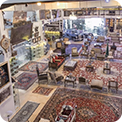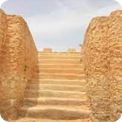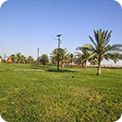Northern Borders Province Landmarks

The northern border state contains many historical and cultural attractions and tourist sites that are the most attractive areas for tourists to visit in the Kingdom of Saudi Arabia.
Northern Borders Museum
It highlights the cultural and historical dimensions of the northern border, as well as spreading awareness among people. It aims to preserve and document the effects and heritage of the province. The museum includes the following: The museum's exhibition halls, administration, and warehouses.
Al-Obaid Museum
It consists of three halls containing a collection of heritage pieces displayed inside the glass cabinets. Some of the exhibits, especially the large and heavy ones, are displayed directly on the floor, while others are hung on the walls. Among the most important exhibits in the museum are a collection of valuable and heritage books, in addition to a collection of war tools such as swords, daggers, guns, and women's jewelry. Also, there are household items that were used in the past, some gemstones and coins, as well as a set of audio and music devices, incensers, ink pots, scales, some beads, pendants, lanterns, jars, and seals.

Al-Jawharah Heritage Museum
The museum consists of 2 rooms, a reception hall, and a guest lounge area. The main hall displays textiles, coins, old newspapers, maps, and cooking utensils. While the second hall displays the Arab hospitality lounge, Arabic coffee tools, wool crafts, and stone designs. The reception hall also displays some heritage items. And finally, the guest restroom is equipped with pieces of traditional old carpets, several pillows, and backrests. The museum has special visit times for women and female employees.
Dawqara Palace
An archaeological site situated 40 km west of Tarif Governorate, in the Northern Borders State. The site dates back to the late Roman or early Islamic period. Some researchers believe that the buildings are still in the history of the Duchess until the Umayyad period.

Zubaida Road
It is considered one of the most important remains that indicate the importance of the geographical location of the northern border. Attributed to the Abbasid caliph Harun al-Rashid, wife of Zubaydah, daughter of Ja`far al-Akbar, son of Abu Ja`far al-Mansur, for her interest in digging ponds and canals, as well as building dams on the Hajj road to Iraq and Khorasan towards Mecca. The road was popular before Islam (the puzzling Mecca road), and it paid special attention to the Abbasid caliphs; The Abbasid caliph Abu al-Abbas ordered Al-Saffah to put up signs about miles on the road and set fire at the night to guide pilgrims.
Things to do in Northern Borders Province

Arar National Park
This wonderful and quiet park is a great place to sit, especially for families with their children. It hosts many recreational elements and seating places as well as restaurants. It also offers plenty of sports, an itinerary for walking and running, and entertainment programs. Moreover, it offers some cruises.
At-Taysiyah Natural Reserve
The nature reserve is located in the northeast of the Kingdom of Saudi Arabia, with an area of 4272 square kilometers. It was designated as a nature reserve in 1995. The geographical patterns of the reserve include sand dunes, shallow valleys, and steppe desert. Due to its nature, the reserve becomes a destination for young Houbara migrants during the winter season. The reserve is also the habitat of Reem Al Ghazal, Ostriches, and Arabian Oryx.





























































